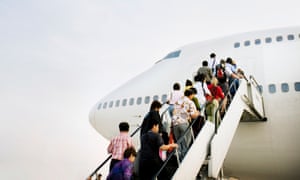Disruptive Passenger Threats on Air Flights
"The kind of behaviours that ... might be acceptable on the ground take on a completely different complexion when you’re in the air.""I don’t think anybody knows exactly the reason driving the rise. Perhaps it’s just reflective of societal changes where anti-social behaviour is more prevalent and perhaps more accepted."
"For bar operators and restaurateurs, we’re also saying to them, look: you also have a responsibility to make sure ... you’re not promoting binge drinking."
"We expect to see more countries become parties to the 2014 international treaty allowing authorities to arrest passengers at a plane's destination] protocol in the coming weeks and months ahead."
Tom Colehan, IATA’s assistant director of government and industry affairs
 |
| ‘Frustrations with journey’ believed to account for increase in plane rage. Photograph: Sam Diephuis/Getty Images |
And threaten the flight they do. Creating disruptive events and spreading fear among other passengers that their psychotic and all-too-often alcoholic displays of loss of control tinged with a perceived level of disinterest in the welfare of everyone sharing the flight, creates an atmosphere of terror. Mind, it isn't only passengers on air flights who occasionally display irritated episodes of bad and threatening behaviour; there are times when airlines employees themselves create episodes of alarming displays of abuse, sometimes with violence thrown in for good measure.
As when infamously, security personnel on a United Airlines plane manhandled a passenger seated in his allocated space that he had paid for and who was anticipating a trouble-free flight because he knew he was expected the next morning to conduct surgery on a patient, who refused to obey the dictate that he relinquish his seat because the airlines had overbooked the flight and seats were needed, not for passengers in the lurch, but for transiting airlines employees. Still, it is the issue of passengers themselves acting out and behaving atrociously, creating tense and dangerous situations in flight that the IATA report singularly addressed.
An increase in the number of serious incidents where alcohol and violence were involved when travellers imbibed in the former and exerted the latter, that has become an increasingly troublesome concern where airlines must react by having their staffs physically restrain a growing number of disorderly passengers. The statistics indicate a 50 percent rise in 2016 over the year before, with 169 passengers globally forcibly confined. This confinement resulted as a reaction to everything from verbal threats and physical abuse to life-threatening actions, including efforts by passengers to enter the plane cockpit.
An intoxicated passenger struggled to breach the cockpit door of an American Airlines plane en route to Honolulu, necessitating the escort of the flight by fighter jets until the fright was resolved, the plane landed, the obstreperous passenger removed. The types of incidents vary, but what remains unvarying is the threat is there and it is growing, and the airlines must face the need to respond while at the same time reassuring other passengers that the flight is not being imperilled. Aside from which airlines now must be aware of local laws enabling prosecutions for offences. Moreover, airline crews must be trained to respond to violence.
As it happens, the total number of reported incidents of passenger disruptions in flight fell by close to ten percent to 9,837, but the proportion considered to represent a higher risk was increased from 2015 figures. One incident was reported for one of every 1,434 flights on average, while in twelve percent of such incidents physical assault occurred, and a third of all incidents involving 3,288 passengers were linked to intoxication, among which 444 events were noted as cases that had physically escalated.
As for those incidents related to safety rules, linked offences involved passengers smoking on board, in the main cabin or in the bathrooms. Such figures, accounting for 190 of the world's airlines "are likely to significantly underestimate the extent of the problem", cautioned Tim Colehan, IATA's assistant director for external affairs.
Labels: Airlines, Crisis Management, Human Relations

0 Comments:
Post a Comment
<< Home